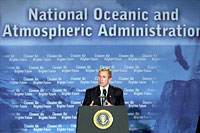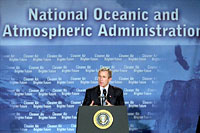Inside the Beltway, the climate movement is comatose.
During the Clinton-Gore years, while the U.S. dragged its feet in international climate negotiations, the major national environmental groups allowed themselves to be used by the administration. Seduced by the former vice president’s rhetoric, the groups watched their issue disappear from the political arena when Al Gore sacrificed his convictions to his ambitions and made global warming the subject of a personal vow of silence during his presidential campaign.
The inability of the nation’s large, mainstream environmental groups to mobilize the public around the immense threat of climate change — and their failure to forge alliances with public-health, development, corporate-accountability, and labor activists — paved the way for the do-nothing climate agenda of President Bush.
In the wake of that failure, the responsibility for mobilizing the public has fallen on the shoulders of local climate activists. And the magnitude of their challenge — in both the political and natural arenas — is truly daunting.

Lip service is no service.
Taking his cues from ExxonMobil and the coal industry, Bush reneged on his promise to cap power plant emissions. Next, he withdrew the U.S. from the Kyoto Protocol. He then released his energy plan — a fast track to climate disaster. Finally, he dismissed predictions by the U.S. EPA and other agencies of serious pending climate impacts in the U.S.
The public response to the Bush agenda might have been different had the national groups put their energies into relentlessly trumpeting the truth about the climate crisis. Because the truth speaks for itself: Around the world, the deep oceans are heating, the tundra is thawing, ice shelves are breaking up, sea levels are rising, fish, insects, birds and ecosystems are migrating, violent weather is increasing, and the timing of the seasons has changed — all from a 1-degree Fahrenheit temperature increase. The scientific consensus is that temperatures will rise an additional 2 to 10 degrees by the end of this century. The world’s property insurers saw their losses increase six-fold between the 1980s and the 1990s. Two years ago, the biggest insurer in Great Britain, CGNU, said that unchecked climate change could bankrupt the global economy by 2065.
Nature’s message is remarkably simple: Cut carbon emissions quickly, globally, and dramatically, or prepare for a future of environmental and economic disintegration.
Don’t Follow These Leaders
Only strong leadership could stave off these catastrophic consequences at this late date. Unfortunately, that leadership has not come from the big, D.C.-based environmental groups. Too often, these organizations are at the mercy of funders whose agendas range from protecting wetlands to keeping disposable diapers out of landfills. “These groups are running around trying to put out all these fires,” environmental journalist Dianne Dumanoski has written, “but nobody’s going after the pyromaniac.”
Even those groups that do focus on climate change seem trapped in a Beltway mentality that measures progress in “politically realistic” nibbles. For example, before Bush withdrew the U.S. from the Kyoto negotiations, representatives of several major environmental groups — World Wildlife Fund, the Union of Concerned Scientists, and the Natural Resources Defense Council — spent considerable energy and talent bird-dogging excruciatingly minute and arcane provisions of the climate treaty, rather than mobilizing their supporters and focusing public outrage on the obstructionism of U.S. negotiators.
To wit: When the E.U. decided it would meet at least half its emissions reductions obligations domestically — and limit the amount of cheap offsets it would buy in developing countries — the U.S. held out for achieving its entire obligation through such offsets. The troika of U.S. environmental groups worked futilely to get the U.S. to agree to some small percentage of domestic cuts, when they should have held a series of press conferences exposing U.S. recalcitrance. By trying so hard to be inside players, these environmentalists effectively marginalized themselves.
One of the most visible environmental groups, the Pew Center on Global Climate Change, eloquently acknowledges the urgency of the threat but resists calls for emission-cutting regulations, relying instead on the voluntary efforts of a few climate-conscious corporations. But history has proved that a voluntary corporate approach does not work. Without strong government leadership — and a set of binding regulations to allow companies to make policy changes in lockstep to avoid jeopardizing their competitive standing — even the best-intentioned corporations cannot significantly slow climate change.

Over-the-Hill policies?
Even more disturbingly, some environmental professionals actually accommodated the agenda of the fossil fuel lobby. In 1997, the coal and oil industries spent $13 million on an anti-climate campaign, which led to a Senate resolution not to ratify any climate change accord that exempted developing countries from first-round emissions cuts. In response to the resolution, Gore did an about-face and called on developing countries to consider first-round emissions cuts. Shortly thereafter, one prominent group, Environmental Defense, began pressuring delegates from poor countries to cut emissions — in direct contradiction of the U.N. framework on climate change. (Under that framework, which was approved in 1992 by the first President Bush, only industrial countries are required to cut emissions in the first phase of the Kyoto Protocol, on the basis that they are largely responsible for causing climate change and possess the resources to begin to mitigate it. Developing countries are slated to begin cutting emissions in subsequent rounds.)
By kowtowing to the power structure, U.S. environmental groups suffered a significant loss of credibility with their overseas counterparts during climate negotiations. In one closed-door meeting during the 1999 round of climate talks in Bonn, Germany, the head of an Indian nongovernmental organization blasted the U.S. environmental groups for being so eager to preserve access to the White House that they were turning their backs on the climate issue, as well as on all those donors who assumed the groups would be acting on behalf of the planet.
“You are supposed to be the conscience of the global environment,” the leader told U.S. environmentalists, “but instead you are more concerned with acting like junior cabinet ministers.”
There’s Something Happening Here
If there is a silver lining to this dark cloud, it is that out of the vacuum of national leadership, a new climate movement has emerged. It is scattered in pockets throughout the country: in Olympia, St. Paul, Boston, Portland, New Orleans, Austin, and San Francisco, and in countless churches and campuses where dedicated activists, impatient with the lack of activity on the national front, are taking matters into their own hands.
These local climate groups have the freedom — and the potential for effectiveness — that many national groups lack. Their funders are, in many cases, more flexible. They are not constrained by the Beltway-bounded mentality that reduces grand possibilities to disappointing increments. They are less vulnerable to attacks from the fossil fuel lobby, which generally has a minimal local presence. They enjoy more intimate contact with local news outlets and legislators, and more personal engagement with supporters.
And some of their accomplishments have been impressive. Local activists helped push the mayor of Seattle to commit that city to exceed the Kyoto targets. They spearheaded the approval by Bay Area voters of a $100 million bond for wind and solar energy in San Francisco. In New England, they helped officials forge an extraordinary agreement between the New England governors and the premiers of seven Canadian Provinces to reduce emissions to 1990 levels by 2010 — and by 75 to 85 percent thereafter. The Tufts University Climate Initiative, designed to bring the university’s emissions within Kyoto limits, is being replicated in schools around the country. In April, a group of colleges and universities in Pennsylvania announced they will begin buying wind-generated electricity.

Will these kinds of efforts solve the climate crisis? Not a chance, given the need to reduce worldwide carbon emissions by 70 percent through a global transition to clean energy. Ultimately, truly reversing climate change will take a coordinated set of macro-strategies with global reach. (For one example, see “Toward a Real Kyoto Protocol” on my website.)
Does that mean this work is not important? To the contrary, it is critical. The local activists are creating the base of political support that is necessary to achieve any large-scale strategy to control climate change. Every time a city or campus or religious organization works to cut carbon emissions, it is sending a strong message about the importance of climate change, and the political primacy the issue deserves — a message that may ultimately prove even more important than the emissions reductions themselves.
As it expands its base and forges new alliances, the network of local climate activists may gain the necessary leverage to pressure members of Congress into legislative alliances around the climate issue. And those alliances could translate into the kind of aggressive national policies needed to control climate change and power a worldwide transition to clean energy. At the very least, this network is bringing the message home in a way the national groups have thus far failed to do.
Bush’s contempt for nature and the freedom he has given the carbon lobby to dictate his climate policy may yet shock the national environmental groups into newfound effectiveness. That effectiveness might best be achieved by joining forces with local climate activists around the country — and supporting the uncompromising positions of those who are dedicating their lives to this threat.
Absent the rapid mobilization of climate advocates at every level — and the pooling of all their energy, creativity, and resources into a coordinated, no-holds-barred campaign — we will soon be crossing the threshold into climate hell.


